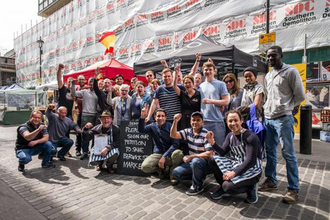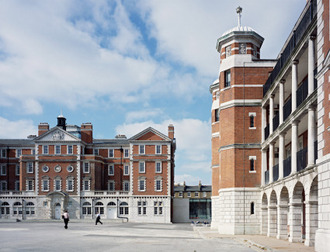-
Removal of Sir Philip Green's KnighthoodDue to his arrogance towards BHS staff and Parliament he has lost the right to keep his title673 of 800 SignaturesCreated by Steve Thompson
-
Prosecute Sports Direct Owner Mike AshleyMike Ashley has made himself a billionaire through illegal and unethical practices. The crimes perpetrated at Sports Direct have been in effect admitted, as widely reported in the national press this week, before a parliamentary select committee. This petition calls upon our director of public prosecutions to hold Mike Ashley to account for these crimes.216 of 300 SignaturesCreated by Andrew Ferguson
-
KEEP BERWICK STREET MARKET INDEPENDENTBerwick Street Market has been independent for 300 years yet Westminster City Council has decided to privatise it with barely any consultation - It's all happening behind the scenes - private operators are already in the tender process and traders’ licences have been terminated without warning. These licences are peoples livelihoods, businesses and relationships, and belong to traders who are part of Soho's history and culture. Berwick Street Market is now the frontline of the relentless cleansing of Soho. @BerW1ckStMarket22,746 of 25,000 SignaturesCreated by Robin Smith
-
Legal breaks for live-in carer'sMake it legally binding that all live-in care work, whether private or through an agency ensure a 2 hour minimum break per day for carers. There should also be a waking night carer throughout the night if necessary.Many carers are exploited by care agencies and private employers as there are no fixed rules for breaks. Most live-in carers are too afraid to speak up in case they lose their job or get bad references. It is very common for carers to work up to 16 hours a day, plus getting up during the night. Most carers get paid from £65 to £95 per day and are still expected to have a happy disposition and fulfill all their duties - often without breaks. Slavery was abolished in the UK nearly 200 years ago. Please stop live in care givers being exploited and invisible and give them the voice and rights they deserve.276 of 300 SignaturesCreated by Diane Carter

-
Implement the promised plug-in grants for electric motorcyclesThe DfT's delay is blighting sales of electric bikes. Orders for hundreds of e-bikes have been put on hold while potential customers await the introduction of the incentive. The failure to implement the e-bike grants could cost jobs in the motorcycle industry and undermines the Government's repeated claims to be promoting green transport. Unlike the grants for cars and vans, a plug-in grant for electric motorcycles would also cut congestion.166 of 200 SignaturesCreated by Paul Smith
-
Watford FC: Pay the Living Wage!The Living Wage is a voluntary hourly rate set independently and updated annually. The Living Wage is calculated according to the basic cost of living in the UK. The current UK Living Wage is £8.25 a hour. As a result, this should be the minimum amount people in the UK are paid each hour to ensure that their wages cover the basic costs of living. In light of the above and the fact that the Premier League's television deal will see the 20 clubs in England's top flight share around £8.3 billion between now and 2019, we believe that a percentage of this income could be spent on paying their employees the Living Wage. Therefore, we petition Watford Football Club to use their share in the new television deal to ensure their staff are paid the Living Wage. If you want to get in contact with us, please see the links below. Email: [email protected] Facebook: https://www.facebook.com/youngwatfordgreens/ Twitter: https://twitter.com/younggreenswd186 of 200 SignaturesCreated by Alex J Murray
-
Keep Safety Qualified Conductors on Abellio ScotRail ServicesJoin the RMT and other Trade Unions in opposition to removing the Guard (Conductor) from Abellio ScotRail services. The recent incident at East Dumbarton, where a traveller sadly suffered from life changing injuries, shows how unsafe Driver Only Operation has become. In this incident it emerged that a group of teenagers raised the alarm to oncoming trains. This was a incident that could've easily been avoided were there a Guard on the service. In the 2 weeks leading up to the end of May we found that a Taxi Driver had to assist a wheelchair passenger off a DOO service at Livingston North as there was only a driver on the train and no second person, another issue that could've been resolved were there a Guard on this service. Further we have seen the ScotRail MD Phil Verster openly tell his employees, via social media, that if a passenger comes running to the train late then the train must depart on time as it could cause a delay to other services - if you know the industry you will know that delays to services cost money - a example of safety over profit. Safety before profit delivers safe trains for Scotland's people, the model that Abellio ScotRail want to follow delivers a unsafe method of operation for Scotland's rail users. Indeed the whole project is about two things; 1) cutting ScotRails wage bill and 2) maximising shareholder profit. Please sign and share this petition widely, join the campaign to keep Scotland's Rail Services Safe.4,114 of 5,000 SignaturesCreated by Richie Veitch
-
Fair pay at Family MosaicWe the undersigned are staff at Family Mosaic Housing Association. We are calling for: 1. A fair cost of living award for all staff including those in Care and Support. 2. Our bonus and benefits to be protected and not removed without consultation. 3. Greater transparency over pay in the organisation.243 of 300 SignaturesCreated by Josephine Grahl
-
UAL, why are you getting rid of technical, student facing staff at Chelsea?The loss of these talented members of technical staff will come at the worst possible point for the MA 2016 cohort and will have grim implications for those who still have the majority of their BA degrees ahead of them too. With resources already stretched to breaking point, contact and support time limited and specialist advice in high demand, we want to know how the University can justify this decision.331 of 400 SignaturesCreated by Jill Kennedy-McNeill
-
Pensions, payouts and protections - put BHS workers ahead of creditors and asset strippers!I used to work at BHS. Between 2009 - 2012 I sold furniture in Store 255, Reading Gate. The people I worked with made it one of the best jobs I've ever had. When the store was closed in 2012, the owner (at that time Phillip Green) tried to get away with providing the least possible support for those of us laid off. But we stuck together, campaigned and won a better deal. Today, BHS is on the verge of collapse. 11,000 jobs - people just like me and my old friends - are at risk. On top of that, the company has a £571 million pension deficit. Some employees have saved all their life. Now their pensions are at risk. And why? Greens Greed - and others like him. Cold, callous and heartless greed. The story of BHS's bankruptcy is one of theft and asset-stripping on a massive scale. Green took £580m+ out then sold the company for £1. The next owner, twice bankrupt Dominic Chappell, has taken millions more. Green underfunded the pension scheme - while paying his wife £400 million in BHS dividends, all channeled through a tax haven. Now the ship is sinking, while Green takes delivery of his new £100 million superyacht. I don't work at BHS anymore. Today, I run ACORN, a national organisation made of 15000 low-middle income renters, service workers, claimants and others, fighting against inequality and for a fairer deal. I want to use this petiton to help BHS workers organise together and win the best outcome possible (if you're a worker, let us know!) BHS collapse could drive 11,000 more people into poverty, welfare and zero-hours contracts risking homes and health. Green, Chappell and the rest must be held liable and made to pay for their crime. Please sign and share.7,370 of 8,000 SignaturesCreated by Stuart Melvin

-
MAKE DUNDEE A NO-WORKFARE CITYThis is an idea that received unanimous support from the Dundee Fairness Commission. The Scottish Unemployed Workers' Network is calling for it to be translated into action. People unable to find work are increasingly being made to work for nothing on pain of losing their benefits and being left destitute. There have been various different work-for-your-benefits schemes - including Community Work Placements that mandate people to work unpaid for 30 hours a week for 6 months, a total of 782 hours, or more than 2 ½ times the maximum community service given as punishment for a crime. The DWP doesn’t actually use the term workfare, which comes from the United States where this approach was developed, but it is a convenient word to use to cover all the different schemes that both punish and exploit the unemployed. Very few of these schemes provide anything at all in the way of useful experience, and the people forced to do them are often treated like skivvies both in the work they are made to do and the attitudes shown to them. Far from building their confidence, as official documents suggest, this forced labour saps the spirit and wears down people’s mental health. And if they deviate at all from what they are being instructed to do they can end up sanctioned and penniless. In addition, rather than increase the numbers of people in paid work, these schemes actually cut across the creation of paid jobs. Why pay someone to work when you can get the labour for nothing? They also provide unfair competition to businesses who want to do the right thing by their workers. These schemes are a major source of worry for everyone who is faced with them, but they have not gone unchallenged – and challenges have elicited widespread support. Naming and shaming of companies and organisations who have exploited this forced labour has persuaded many well-known names to pull out of these schemes, and the Government refuses to publish the names of organisations involved as this would expose them to protests. Keep Volunteering Voluntary has persuaded large numbers of charities and non-profit organisations to sign up to their promise not to use forced labour. Workfare is an integral part of the ‘welfare reform’ juggernaut that is destroying our welfare state. We don’t have the power to change the rules, but a concerted programme of resistance organised at city level could provide a significant contribution to making them unworkable, and also highlight what is happening to those not already aware. We see the first (simple and easily instigated) steps as falling under two headings: 1/ We call on the City Council to agree that it will not itself be party to any workfare schemes and that it will make non-participation a condition for any organisation in receipt of council funding. 2/ We also call on the Council to give official backing to a well-publicised campaign to give formal recognition to all businesses and organisations who agree not to participate in these schemes. This would be similar to the scheme operated by Keep Volunteering Voluntary (who are very interested in the idea of a no-workfare city), but would include commercial organisations and not just voluntary ones. Organisations who have agreed not to exploit workfare would be listed in a well-publicised website and licensed to display a ‘no-workfare city’ logo on their window and publicity materials so that the general public would know where they could go without patronising organisations that use forced labour. This sort of opt-in scheme would avoid the difficulties of getting the accurate and up-to-date information needed for a name and shame list. However, it does need to be very well publicised so that organisations feel under sufficient pressure to take part. Publicity would also help prevent small voluntary organisations from being persuaded by misleadingly worded DWP documents into thinking that by participating in these schemes they are helping unemployed people. It would enable them instead to provide real help that people can access on a voluntary basis.188 of 200 SignaturesCreated by Sarah Glynn
-
Allow Signature Living to Restore The Coal Exchangehttps://vimeo.com/163562207 The Coal Exchange, which stands proudly amongst its peers, has long been left to fall into disrepair. The building is battered and worn after years of decay. When people talk about this building, they will often talk of its past grandeur and place in history as the centre of the world’s controversial coal industry. The building ensured the flow of funds were channelled through her hallways, providing thousands of families with the means to feed and clothe their children. In many cases, what was seen as the centre of their community would also be the very reason to shorten their fragile lives. Whatever your thoughts are on this magnificent building, good or bad, you cannot deny it plays an integral part of the ancestry of Cardiff and wider-Wales. Many of the UK’s listed buildings no longer serve their original purpose, and developers do not wish to go into the detail that is required to save them. What they would prefer to do is sit in their ivory towers, looking no further than the plans strewn across their desks, with their fleet of advisors who serve to sterilise their new structure. This is not our intention. Signature Living and I intend to keep this building as close to the structure as possible. We certainly will not be changing any of the exterior walls, apart from re-engaging them with the building. It is widely known the rear of the building has had to bear the ingress of large amounts of water over many years, which has caused her wooden joints to not only rot, but to disengage from the main structure. This, along with the roof, will be the first of the tasks we set out to complete, as timing here is of the essence. With a listed building, such as The Coal Exchange, it is essential to preserve the structure as was intended when first erected, whilst ensuring it is self-sustaining – with the latter, arguably, being a primary aim for the building. Further Reading http://www.walesonline.co.uk/news/local-news/pictures-show-just-how-wrecked-11192088 http://lawrencekenwright.co.uk/coal-exchange-closed-business/ http://lawrencekenwright.co.uk/plans-return-coal-exchange-former-glory/ http://www.itv.com/news/wales/2016-04-08/cardiffs-coal-exchange-to-be-200-room-luxury-hotel-and-events-venue/ http://www.walesonline.co.uk/whats-on/whats-on-news/how-cardiffs-coal-exchange-look-111525581,473 of 2,000 SignaturesCreated by Lawrence Kenwright
Hello! We use cookies to improve your experience by providing insights into how the site is being used. Find out more.







.png)




